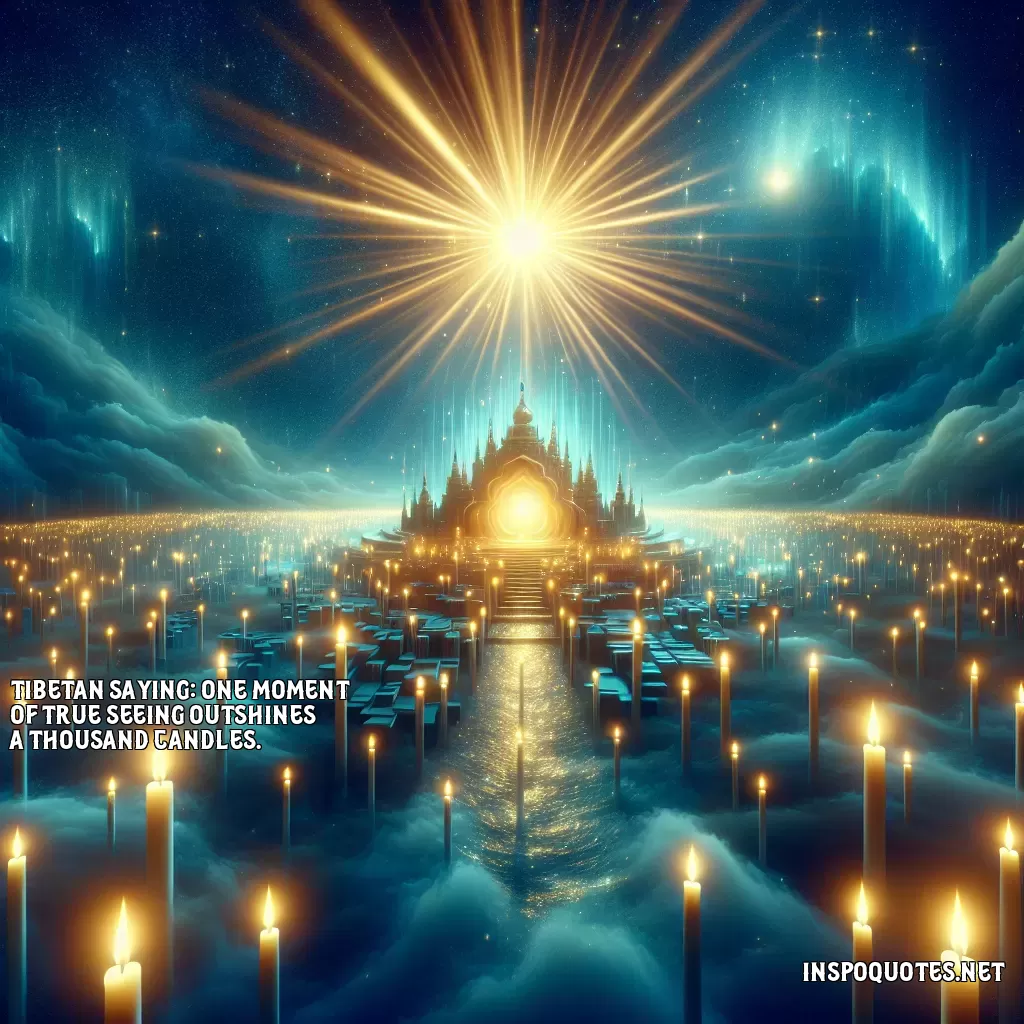
Tibetan Saying: One moment of true seeing outshines a thousand candles.
Author: Tenzin Wangyal Rinpoche
👁️ 9 views

Tibetan Saying: One moment of true seeing outshines a thousand candles.
👁️ 9 views
The Tibetan saying "One moment of true seeing outshines a thousand candles" conveys a profound lesson about the nature and power of genuine insight. At its core, the proverb suggests that a single moment of clarity or deep understanding can illuminate more than countless superficial insights or bits of information. In a metaphorical sense, "true seeing" represents a moment of deep awareness or epiphany, akin to a moment of enlightenment where one perceives the truth of a situation beyond the surface level. This contrasts with ordinary seeing, which might involve viewing things only as they appear, without penetrating their underlying essence. The reference to "a thousand candles" suggests the sheer volume of conventional or ordinary insights or observations that lack the depth or transformative quality of true seeing. This saying underscores the idea that quality and depth of understanding are far more impactful than quantity. Just as one bright light can cast away darkness more effectively than many dim lights, a single moment of profound clarity can bring a comprehensive understanding that simple observations cannot achieve. In a practical context, this might remind us to value those instances when we connect deeply with an idea or truth, as they have the power to truly transform our perspective and understanding. It encourages seeking depth in observation and introspection rather than merely accumulating surface-level knowledge or experiences. The saying thus advocates for an appreciation of moments of genuine insight, which can guide us more effectively than any multitude of shallow understandings.
Quote By: Tenzin Wangyal Rinpoche
Tenzin Wangyal Rinpoche is a prominent Tibetan Buddhist teacher, author, and lineage holder of the Bon tradition, one of the oldest spiritual traditions of Tibet. Born in 1961 in Amdo, Tibet, Tenzin Wangyal Rinpoche was recognized as the reincarnation of a well-known Bon master at a young age. He was formally trained in the teachings, practices, and rituals of the Bon tradition, which emphasizes the importance of the natural world and the cultivation of awareness.
In 1985, Tenzin Wangyal Rinpoche fled Tibet and eventually settled in India. Here, he continued to deepen his practices and was active in teaching the Bon lineage to students both in the West and in Asia. In 1992, he founded the Ligmincha Institute in Virginia, which serves as a center for the study and practice of the Bon tradition. Tenzin Wangyal Rinpoche has made significant contributions to the spread of Bon teachings in the West, emphasizing the importance of integrating ancient wisdom with modern psychological insights.
As an author, Tenzin Wangyal Rinpoche has written a number of influential books that delve into the rich spiritual heritage of Bon. His works, including "Awakening the Luminous Mind," "The Tibetan Yogas of Dream and Sleep," and "Healing With Form, Energy, and Light," have helped to illuminate the profound practices of Tibetan Buddhism for a global audience. In these texts, Tenzin Wangyal Rinpoche offers practical guidance for navigating the complexities of modern life while remaining rooted in traditional spiritual practices.
Throughout his life, Tenzin Wangyal Rinpoche has been dedicated to the preservation and dissemination of the Bon teachings, advocating for the importance of connecting with one’s inner self in order to experience greater compassion and wisdom in daily life. His teachings resonate with practitioners from diverse backgrounds, making him a respected figure in both Buddhist and non-Buddhist communities alike. Today, Tenzin Wangyal Rinpoche continues to travel and teach worldwide, inspiring countless individuals to explore the depths of their consciousness and the world around them.